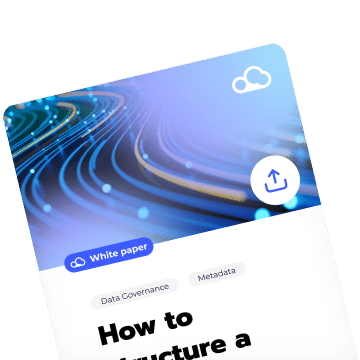Unlocking the full potential of data products requires a meticulous blend of traditional methodologies and innovative strategies. Agile methodologies, such as Scrum and Kanban, stand as pillars in this process, advocating for incremental progress and continuous adaptation.
By embracing agility, teams navigate the ever-evolving data landscape with finesse, mitigating risks and maximizing responsiveness. The combination of Agile and Lean principles further amplifies efficiency and customer-centricity, fostering a culture of continuous improvement.
In this article, we’ll discuss the synergy between Agile methodologies and Lean principles, including their transformative impact on data product development. From iterative refinement cycles to innovative data monetization strategies, the journey toward creating impactful data products is paved with dynamic methodologies and a steadfast commitment to delivering value.
Agile methodologies for data product development
“Agile methodology” is a way to describe a dynamic approach to development, emphasizing the ability to quickly adapt and evolve in response to changing requirements and environments.
Agile methodologies like Scrum and Kanban are highly effective and widely used in data product development because they advocate for building a product in small, manageable increments, allowing frequent reassessment and adaptation. Scrum methodology partly relies on a product backlog and user stories, allowing an iterative process and a user-centered approach. The iterative process is invaluable in the fast-paced data landscape, as it enables teams to quickly respond to changes and minimize risks associated with long development cycles.
Examples of Agile methodology success
As we can see, implementing Agile methodologies in a complex, hierarchical organization can result in significant cost savings and improved software quality. Agile methodologies, with their emphasis on flexibility, iterative development, and user engagement, are relevant and can be effectively adapted to the specific challenges and dynamics of developing data products, even though they are not specifically targeted towards it at first.
Agile & Lean principles together for data product development
Combining Agile and Lean principles can further enhance the efficiency and effectiveness of data product development. Lean principles focus on creating more value with fewer resources and eliminating waste. When integrated with Agile’s adaptability and customer-centric approach, it leads to a development process that is not only responsive but also highly efficient and focused on delivering maximum value.
This combination encourages a deep understanding of customer needs and a commitment to continuous improvement, driving the development of successful, high-quality data products.
Iterative refinement for successful data products
The iterative refinement process is a continuous cycle. It involves analyzing user feedback, making improvements, and deploying updates. This iterative approach leads to better user satisfaction and product evolution. Striking the right balance between feature development and ongoing maintenance ensures that the data product remains relevant and valuable.
Data monetization & business impact
Data monetization refers to the process of generating revenue by leveraging data assets that a company has. Companies collect and store massive amounts of data on their users, customers, operations, and markets. There are various strategies that businesses can use to monetize their data products, including direct monetization, indirect monetization, Data as a Service, and licensing and partnerships.
Direct monetization involves selling data or analytics services directly to customers, while indirect monetization consists of leveraging data to gain a deeper understanding of market trends, customer needs, and marketing focus. With DaaS, companies can offer data management, data-driven insights, and analytics as a service, while licensing and partnerships involve collaborating with other companies to utilize data.
There are various real-world examples of companies effectively monetizing their data, resulting in revenue growth, market expansion, and increased competitiveness.
Data monetization real-world examples
Financial institutions such as Mastercard are utilizing transaction data to offer tailored insights and consulting services, converting their data into a strategic advisory tool. Many businesses are employing user behavior and preference data to create personalized experiences and targeted advertising, ultimately increasing user engagement and generating new revenue streams.
In the fashion industry, large platforms are utilizing their customer data to provide in-depth consumer insights to brands, assisting them in enhancing their marketing strategies and improving product development.
These examples illustrate how companies in various sectors are creatively transforming their data into valuable assets, exploring innovative avenues for revenue generation beyond traditional data usage. Perhaps the best monetization models have not been discovered yet.
Conclusion
In conclusion, the fusion of traditional and innovative methodologies forms the cornerstone of successful data product development. Agile frameworks like Scrum and Kanban provide the agility necessary to navigate the complexities of the data landscape while integrating Lean principles enhances efficiency and customer-centricity.
Through iterative refinement and creative data monetization strategies, organizations can harness the full potential of their data assets, driving growth, profitability, and sustainable competitive advantage. As technology continues to evolve, embracing dynamic methodologies remains essential for staying ahead in the ever-changing data-driven ecosystem.
Do you still have questions about data governance? Turn to DataGalaxy to create your company’s data lineage mapping, develop a standardized business glossary, and much more! Check our calendar and select a date that works for you. Jumpstart your free 15-day platform trial access & start making the most of your data today!





